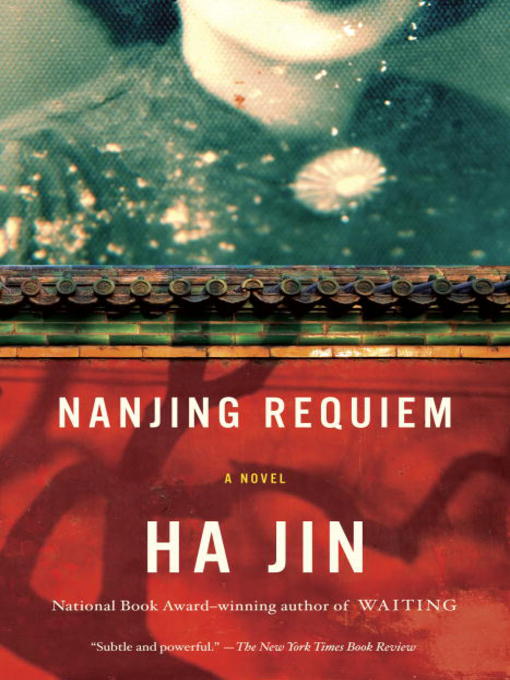
Nanjing Requiem
A Novel
کتاب های مرتبط
- اطلاعات
- نقد و بررسی
- دیدگاه کاربران
نقد و بررسی

June 20, 2011
For his sixth novel, Jin (Waiting) focuses on the atrocities committed by the Japanese occupiers in 1937 Nanjing. Jin describes horrible acts in a style bordering on reportage, lending bitter realism to his chronicle of violence and privation. While much will be familiar to readers of Iris Chang's The Rape of Nanjing, Jin anchors his tale on two characters: the middle-aged narrator, Anling Gao, and real-life American missionary Minnie Vautrin, dean of Jinling Women's College. Anling assists Minnie, and through her eyes we follow the missionary's heroic decision to open the college to homeless refugees, creating a safety zone that the Japanese can't penetrate. Jin wants to celebrate this "Goddess of Mercy" who sheltered more than 10,000 women and children, endured near daily menace from the Japanese, and literally worked herself to death. Anling too makes a heartbreaking sacrifice, although her torment is secret, since she cannot acknowledge her son's Japanese wife nor the child they bear. Jin's dialogue includes some unfortunate anachronisms ("cut to the chase"; "pain in the ass"), contemporary phrases that wouldn't have been part of a pious Chinese or American woman's vocabulary in the 1930s. Despite these minor lapses, Jin paints a convincing, harrowing portrait of heroism in the face of brutality.

Starred review from September 1, 2011
A historical novel with a timeless theme—the inhumanly human brutality of war and the attempt to sustain a life of compassion and grace in response to it.
There's a real person and a real atrocity at the heart of the latest fiction by the award-winning Ha Jin (A Free Life, 2007, etc.). The atrocity is the late 1930s occupation of China by Japan, a period during which, says the novel's narrator, "[t]hey meant to destroy China's potential for resistance and to terrify us into obedience." Such terror took the form of rampant rape (in what has become notorious as "the rape of Nanking") and indiscriminate murder. The novel's real-life protagonist, whose diaries and correspondence served as source material, is Minnie Vautrin, an American missionary who turned the women's college where she was dean into a refuge for some 10,000 Chinese women and children. Her story is told through the eyes and voice of Anling Gao, Vautrin's assistant who serves as her "unofficial proxy" as a Chinese-speaking citizen. In the novel's early stages, the narrative strategy seems limiting, for Anling is neither particularly eloquent nor psychologically astute. She tells what she sees, and she has a good eye for detail, but shows no deep insight into the qualities that elevate Vautrin into sainthood among so many of those she saved, or to Vautrin's resistance to such lofty regard. "I hate to see them confuse humanity with divinity," the narrator quotes the protagonist. "It's not right to be called a goddess while I'm doing mission work." Yet the novelist's subtle mastery enriches the work, as Angling shifts from the role of witness to an integral position in the plot, and the complexities of relations among Americans, Chinese, Japanese (and eventually Germans, Russians and others) continue to multiply. Ultimately, Vautrin's resistance to her deification proves well warranted, though the novel presents her as an indelible figure worthy of its celebration.
A matter-of-fact, plainspoken narrative that has a profound impact.
(COPYRIGHT (2011) KIRKUS REVIEWS/NIELSEN BUSINESS MEDIA, INC. ALL RIGHTS RESERVED.)

June 1, 2011
In 1937, as the Japanese were preparing to invade Nanjing, American missionary Minnie Vautrin stuck to her post as dean of Jinling Women's College. Now the college is a refugee camp swarming with 10,000 people, which Minnie tries to manage while mourning those she cannot save. Since Ha Jin won the National Book Award for Waiting, his writing keeps opening up like a big, beautiful fan. A bold look into last century's heart of darkness; essential where good literature is read.
Copyright 2011 Library Journal, LLC Used with permission.

Starred review from July 1, 2011
Ha Jin continues his scrupulous excavation of buried truths about Chinese life, paying homage to the unsung heroes of the Rape of Nanjing in this eviscerating novel. Anchored in a sea of blood to the American-run Jinling Women's College, this plainspoken tale of atrocities and courage focuses on the school's dean, Minnie Vautrin, a basketball-playing missionary from Illinois, who turned the bucolic campus into a refugee camp for thousands of imperiled women and children. Although the real-life Vautrin (18861941) kept a war diary, Ha Jin relies on an imaginary narrator, Anling Gao, Minnie's smart and steadfast second-in-command, who unflinchingly chronicles the occupying Japanese army's ferocious violence against Chinese civilians and the struggles of profoundly traumatized survivors. Although her own family is cruelly fractured and her faith in God shaken, Anling stands with Minnie as she confronts the enemy with uncommon valor and purpose. Readers with fortitude will discover in Ha Jin's explicit and unique dramatization precisely what it meant to endure this monumental historical hell and the crucial role Minnie and other foreigners played in protecting citizens and gathering evidence of war crimes. Writing with unnerving austerity, Ha Jin resolutely addresses inexplicable terror and miraculous resistance as Minnie, known in Nanjing as the Goddess of Mercy, counsels others not to let hatred run their lives. HIGH-DEMAND BACKSTORY: National Book Award and PEN/Faulkner Awardwinning Ha Jinalways makes literary news, and the historical subject of this intense novel will attract particularly avid interest.(Reprinted with permission of Booklist, copyright 2011, American Library Association.)

























دیدگاه کاربران